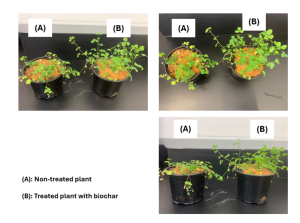
Eco-Friendly Soil Rejuvenation: Enhancing Arid Agriculture with Biochar Innovations at Fujairah Research Centre
Soil is considered the main substrate for plant growth, playing a fundamental role in determining the quality and health of crops. In arid and semi-arid regions, which are characterized by limited water availability and low nutrient content, maintaining soil fertility is a significant challenge. These regions, often plagued by drought and poor soil structure, face additional risks from climate change and desertification. One common approach to addressing soil nutrient deficiencies has been the use of chemical fertilizers. While these fertilizers can temporarily boost soil nutrients and increase crop yields, they carry significant environmental risks. Excessive use of chemical fertilizers can lead to soil degradation, water contamination, loss of biodiversity, and even contribute to greenhouse gas emissions. This has prompted a search for more sustainable and eco-friendly alternatives for soil requalification.
Recognizing these challenges, the Plant Team at the Fujairah Research Centre (FRC) is actively exploring natural and sustainable methods to improve soil health in the region. One promising solution they have been investigating is the use of biochar, a carbon-rich material produced through the pyrolysis of organic waste. Biochar has gained attention for its ability to enhance soil properties, improve water retention, and increase nutrient availability without the harmful environmental side effects associated with chemical fertilizers. The FRC Plant Team has focused on producing biochar from local agricultural and organic waste, turning what would otherwise be discarded materials into a valuable resource for improving soil quality. Their recent findings demonstrate that biochar made from waste has a significant and positive impact on the local soil, improving its structure and nutrient retention capacity. In addition, crops grown in biochar-amended soils have shown improved health and productivity, which suggests biochar could be a viable, eco-friendly solution for sustainable agriculture in arid and semi-arid regions like Fujairah.By integrating biochar into local agricultural practices, the FRC is not only addressing soil degradation but also promoting a circular economy that transforms waste into a valuable resource. This innovative approach offers a promising way to tackle both environmental sustainability and food security challenges, contributing to a more resilient agricultural system in regions facing harsh climatic conditions. The ongoing research at FRC underscores the potential of natural soil amendments like biochar in promoting sustainable land management and ensuring long-term agricultural productivity without compromising the environment.
